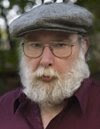
There has been a lot of attention given to T.S. (Thomas Stearns) Eliot (1888-1965) here lately. Both The American Conservative and Commentary have recently published lengthy articles about the man, and the long-awaited "official" biography seems to loom once again upon the literary horizon.
The facts of his life are too easily available online to hash them over here. Suffice to say that he was born in Missouri and then attended Harvard after a three-year sojourn in a private prep school. He soon thereafter skedaddled off to England and never again left except for speaking engagements. Hemingway once said that novelist Henry James could have profited from a "whiff of the Chicago stockyards." Apparently Eliot did did get that whiff and quit these shores as quickly as he could soon thereafter.
In the teens and twenties he wrote a number of unrhymed and unmetered poems such as "The Waste Land" and "The Hollow Men" whose titles are self-explanatory and reveal a great deal about Mr. Eliot's sensibilities. The following from "The Hollow Men" are among his most famous and most often quoted lines.
This is the way the world ends
This is the way the world ends
This is the way the world ends
Not with a bang but a whimper.
Whether or not he was correct remains to be seen. At any rate, his poetry attracted a great deal of critical attention and he was awarded the Nobel Prize for Literature in 1948.
Eliot had long since taken British citizenship and come to describe himself as, "An Anglo-Catholic in religion, a classicist in literature, and a royalist in politics."
One of the great ironies of literature in this age is that Eliot, who is often considered the quintessential conservative, is also cited as the apex of literary modernism.
Eliot also wrote some light verse, the most famous of which was Old Possum's Book of Practical Cats, "Old Possum" being Ezra Pound's nickname for him. After Eliot's death, it became the basis of the musical, Cats, by Andrew Lloyd Webber.
In recent years much has been made of his Anti-Semitism, which is undeniable and apparent in such poems as "Burbank with a Baedeker: Bleistein with a Cigar" in which he says, "The rats are underneath the piles / The Jew is underneath the lot." Or in "A Cooking Egg," which contains the following: "The red-eyed scavengers are creeping in / From Kentish Town and Golder's Green," Golders Green being a largely Jewish suburb of London. Little can be said in his defense on this score other than to point out that during the decades in which he wrote such sentiments were far more socially acceptable, especially in the rarefied circles in which moved, than they are today in our post-Holocaust world. Personally, my take on the subject is this: Jews are, by and large, a passionate, energetic people, and Eliot, who operated exclusively in the testosterone-free zone, seems to have been repelled by anyone with a pulse that ran over thirty beats per minute. As a consequence, Jews seem to have come to personify for him anyone with any zest for life.
If one considers such poems as "A Cooking Egg" and "Sweeney Among The Nightingales" (both readily available online) one soon realizes that any meaning to be found in much of Eliot's verse is so intensely personal as to be useless to the general reader. On the other hand, if one takes seriously H.L. Mencken's observation (and Mencken was a first class literary critic) that poetry should strive to be nothing more than gorgeous word music, then Eliot is indeed---in his rhymed and metered poetry at least---a first class poet. If one thinks that poetry should be more than that, then it is obvious that such poems as "A cooking Egg" are meaningful only to the seventeen people in the entire world who are both fluent in French and intimately familiar with Greek mythology, British financial history, and London urban geography in the 1930s. That makes for a rather small audience.
Yet I find myself going back to these poems several times a year simply for what Mencken called "the beauty of the word music."
I have read a lot about and by Eliot, so in conclusion I will herein give my opinion: though born and raised in St. Louis, he was descended from a long line of long-faced Puritans and kin to all the Right People, meaning all those stalwart New Englanders who pinned the Scarlet Letter on Hester for fornication and then proceeded to get rich in the slave trade. As a consequence of this Puritan background, he had a great respect for personal guilt---and especially in its value to a literary career---yet he was never able able to accumulate quite enough to satisfy himself. As the fellow who put the "P" in "persnickety," sinning did not come easily to Thomas Stearns Eliot. In fact, I am convinced that the great secret tragedy of his life was that his turds didn't come out wrapped in cellophane
***


